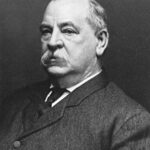The Venezuelan Boundary Crisis Decision
President Grover Cleveland transformed a distant territorial dispute into a major international crisis in December 1895. He delivered a fiery message to Congress demanding Britain submit the Venezuelan Boundary Crisis to binding arbitration. Cleveland invoked the Monroe Doctrine with unprecedented force. His message declared America would resist any European attempt to extend control in the Western Hemisphere. ⚠️ The president gave Britain a stark ultimatum: accept arbitration or face potential military confrontation.
Cleveland’s Aggressive Diplomacy
Secretary of State Richard Olney had already sent Britain a provocative note earlier that year. The note declared the United States “practically sovereign on this continent.” British Prime Minister Lord Salisbury dismissed American claims with aristocratic disdain. Cleveland’s congressional message escalated tensions dramatically beyond diplomatic protocol. 📊 He requested $100,000 to establish a boundary commission to determine the “true divisional line” between Venezuela and British Guiana.
Domestic Political Calculations
Critics argued Cleveland manufactured the Venezuelan Boundary Crisis for political gain. His Democratic Party faced devastating losses in recent midterm elections. The president’s approval ratings had plummeted due to economic depression. 💰 Cleveland may have sought to distract voters from domestic economic failures through aggressive foreign policy rhetoric.
Impact:
International Consequences
The Venezuelan Boundary Crisis brought the world’s two strongest naval powers to the brink of war. 🔥 British and American warships prepared for potential conflict in the Caribbean. Financial markets on both sides of the Atlantic plunged as investors feared military confrontation. London’s stock exchange experienced panic selling. Wall Street similarly trembled at the prospect of war with Britain.
Diplomatic Resolution
Cooler heads ultimately prevailed through quiet diplomatic channels. Britain agreed to arbitration after Germany’s Kaiser Wilhelm II sent the inflammatory Kruger Telegram. This message congratulated the Boers for repelling a British raid in South Africa. Britain suddenly faced potential conflicts on multiple fronts. 🌍 The Venezuelan crisis was resolved through international arbitration in 1899, largely favoring British territorial claims.
Long-term Strategic Shift
The crisis marked a turning point in Anglo-American relations. Both nations recognized the dangers of military confrontation between democratic powers. Britain began viewing America as a potential ally rather than rival. 📉 The incident accelerated Britain’s strategic withdrawal from the Western Hemisphere. This shift allowed America to emerge as the dominant regional power. The resolution established precedents for peaceful dispute settlement between major democracies.
